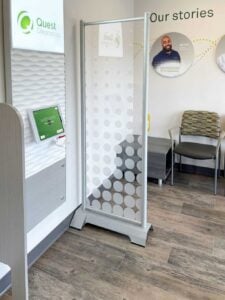Accessibility Kiosks Legal News
From KI – October 26th 10am – The courts find for ACB in suit against Quest. The case involved injunctive relief. So, that means an order telling quest to fix it and attorney fees for the plaintiff. We are checking with ACB to make sure we are identifying the correct unit (aka unit violating ADA). As for an appeal, it would go to the Ninth Circuit, which tends to be more on the side of persons with disabilities than not. We imagine there could be post verdict motions. As far as cost goes, plaintiffs would be entitled to their attorney fees and the defendant would of course have to pay their own attorney fees as well. A relevant blog entry is here. Just What Is a Sales Establishment Anyway per Title III of the ADA?
Thanks to Bill for alerting us. He is a great and recommended resource. William D. Goren, Esq., J.D., LL.M., Attorney and Consultant, Americans with Disabilities Act (ADA), https://www.
ALEXANDRIA, Va., Oct. 25, 2023 /PRNewswire/ — Following a week-long bench trial in Los Angeles, a federal court in California found Quest Diagnostics in violation of the Americans with Disabilities Act and permanently enjoined Quest from continuing to violate the ADA.
Beginning in 2016, Quest Diagnostics began to install self-service kiosks at its Patient Service Centers, which allow patients to, among other things, check in for phlebotomy appointments in a private and independent manner. Following complaints from ACB’s members that these kiosks as designed prevent people who are blind from accessing their services, ACB joined a civil rights complaint in federal court alleging that Quest’s kiosks deprived members of the blind community full and equal enjoyment of Quest’s services and failed to provide effective communication.
The Court ruled in favor of ACB and a nationwide class of blind and low-vision Quest patients. The court found that Quest violated Title III of the ADA in that Quest failed to provide people who are blind with full and equal enjoyment of Quest’s services and facilities because of their disability.
“Self-service kiosks are being used more and more in many aspects of daily public life,” said Dan Spoone, Executive Director for the American Council of the Blind. “The Court’s decision that Quest violated the ADA and that the check-in services of these kiosks must be accessible to people who are blind is a significant step towards ensuring that the rights to full and equal enjoyment and effective communication are protected.”
Deb Cook Lewis, ACB’s president, added, “Although the ADA is more than 30 years old, people who are blind are still forced to fight for full and equal access to healthcare. This judgment sends a clear message that full and equal enjoyment is required by law, and health care providers must ensure access for people with disabilities.”
This litigation has been led by ACB’s counsel at Nye Sterling Hale Miller and Sweet and at Handley Farah & Anderson.
Matthew Handley, one of ACB’s attorneys in the litigation, added, “Touchscreen kiosks are an ever-increasing aspect of our daily lives – this decision ensures that accessibility of those kiosks will need to be front and center in the minds of every company wishing to make use of self-service technology.”
About the American Council of the Blind
The American Council of the Blind is a national member-driven consumer organization representing Americans who are blind and visually impaired. During the organization’s 60-year history, ACB has become a leader in national, state, local, and even international advocacy efforts. With 66 affiliates, ACB strives to increase independence, security, equality of opportunity, and to improve the quality of life for all people who are blind and visually impaired. For more information, visit ACB’s website.
About Handley Farah & Anderson
Handley Farah & Anderson are lawyers who seek to improve the world. Based in Washington, D.C., they fight for: workers deprived of wages, consumers deceived about products, tenants denied access to housing, parents deprived of adequate parental leave, persons with disabilities denied access, and women and communities of color subject to discrimination.
SOURCE American Council of the Blind
More Background
ID Card Scanning
Always a pain here is a video on how Acuant used in Quest kiosk
Quest Diagnostics Streamlines Patient Check-in with Aila’s Interactive Kiosk
Quest Diagnostics selected Aila’s Interactive Kiosk as a rugged, adaptable self-service platform to create its next-generation patient check-in experience. Aila’s expertise in patient check-in for enterprise healthcare providers gave Quest the confidence that Aila could provide the technology and support to deploy a major new experience in its patient service centers. “Aila was a known solution that would work for us,” said Congersky, “this helped us avoid a lengthy product exploration process.”
The Interactive Kiosk was able to save phlebotomists’ time by automating a range of customer experiences that previously required face-to-face interaction:
- ID and insurance card scanning
- Smartphone scanning for pre-registered patients
- Digital check-in and wait list queuing
The Interactive Kiosk also provided a platform that was adaptable for Quest’s evolving check-in experience. This includes, a way for patients to check in for someone else, such as a child or parent, schedule service times on-site, and give patients the option to wait in their vehicle after checking in where they’ll receive a text message when it’s their turn.
In combination with Aila’s Interactive Kiosk and floor stand, Quest further improved the check-in experience by developing a welcome center that also included wall-mounted Interactive Kiosks. This helps guide patients to the self-service center and provides a welcoming environment to check in. Having a range of mounting options to choose from further illustrates Aila’s ability to enable ideal solutions across thousands of locations with differing layouts.


